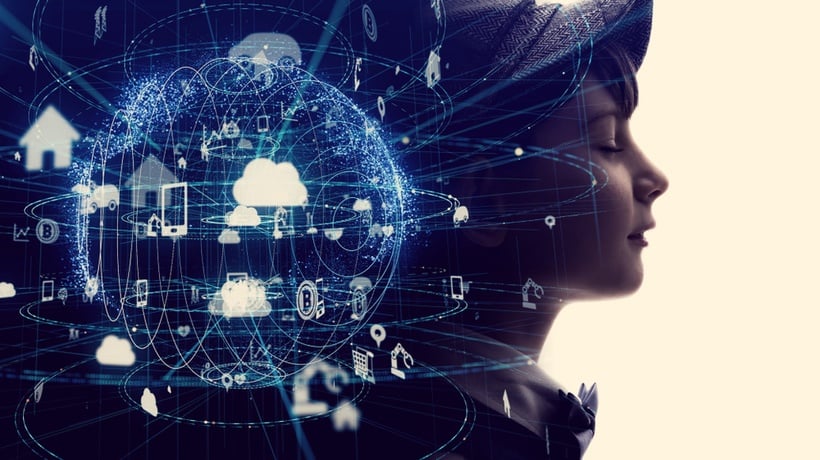Effective employee onboarding is critical to the success of any business. It sets the tone for employee engagement, productivity, and retention. One important aspect of onboarding is training employees on the tools and technologies they will be using in their roles. As AI-powered language models become more prevalent in the workplace, it's important to incorporate ChatGPT literacy training into employee onboarding to ensure that employees can communicate effectively and efficiently. In this blog post, we'll explore tips for incorporating ChatGPT literacy training into employee onboarding.
ChatGPT Literacy For Corporate Teams Of All Sizes (Online Course) (Sign Up!)
1. Introduce ChatGPT Early
Introduce ChatGPT to new employees early in their onboarding process. This can be done through a presentation, training session, or informational video. Make sure to explain the benefits of ChatGPT and how it can help employees communicate more effectively in their roles.
2. Provide Hands-On Training
Provide hands-on training to help employees become comfortable using ChatGPT. This can be done through guided practice exercises, group discussions, or one-on-one coaching sessions. Encourage employees to ask questions and provide feedback throughout the training process.
3. Highlight Best Practices
Highlight best practices for using ChatGPT effectively. This may include tips for writing clearly and concisely, using appropriate tone and language, and incorporating emotional intelligence into written communication. Provide examples of effective communication using ChatGPT and encourage employees to practice these techniques in their own writing.
4. Incorporate Feedback
Incorporate feedback into ChatGPT literacy training. Encourage employees to provide feedback on their experiences using ChatGPT and incorporate this feedback into future training sessions. This can help ensure that the training is effective and relevant to employees' needs.
5. Reinforce Learning
Reinforce learning by providing ongoing support and resources for using ChatGPT effectively. This may include access to training materials, online resources, or coaching sessions. Encourage employees to continue practicing their ChatGPT literacy skills and provide opportunities for them to apply their learning in real-world situations.
In conclusion, incorporating ChatGPT literacy training into employee onboarding can help ensure that employees are equipped with the skills they need to communicate effectively in their roles. By introducing ChatGPT early, providing hands-on training, highlighting best practices, incorporating feedback, and reinforcing learning, businesses can help employees become confident and proficient in using this AI-powered language model. This can lead to greater employee engagement, productivity, and success for the business.
ChatGPT Literacy For Corporate Teams Of All Sizes (Online Course) (Sign Up!)
Monday, May 01, 2023
ChatGPT For Leadership Development: Empowering Managers To Communicate Effectively
Effective communication is critical to successful leadership. Managers who can communicate clearly, concisely, and persuasively are more likely to inspire and motivate their teams, foster collaboration, and achieve their business objectives. ChatGPT, an AI-powered language model developed by OpenAI, can play a critical role in leadership development by helping managers communicate more effectively. In this blog post, we'll explore the ways ChatGPT can empower managers to become better communicators and leaders.
ChatGPT Literacy For Corporate Teams Of All Sizes (Online Course) (Sign Up!)
1. Writing Assistance
Managers are often tasked with communicating complex ideas to a variety of audiences. ChatGPT can help managers communicate more effectively by suggesting language that is clear, concise, and persuasive. Whether they're writing an email, a memo, or a presentation, ChatGPT can provide real-time feedback and suggestions that help managers communicate their ideas more effectively.
2. Coaching
Coaching is a critical component of leadership development. ChatGPT can provide coaching in real-time, helping managers improve their communication skills as they write. For example, ChatGPT can suggest ways to improve sentence structure, clarify language, or emphasize key points. This can help managers become more confident and effective communicators over time.
3. Personalization
Every manager has their own unique communication style. ChatGPT can learn from a manager's writing and communication style, providing personalized suggestions that align with their preferences and goals. This can help managers communicate more effectively and authentically, without sacrificing their own personal style.
4. Consistency
Consistency is key to effective communication. ChatGPT can help managers maintain consistency in their messaging and tone, even as they communicate with a variety of audiences. This can help build trust and credibility with employees, stakeholders, and customers, ultimately leading to greater success for the business.
ChatGPT Literacy For Corporate Teams Of All Sizes (Online Course) (Sign Up!)
5. Emotional Intelligence
Emotional intelligence is a critical component of effective leadership. ChatGPT can help managers develop their emotional intelligence by suggesting language that is empathetic and emotionally intelligent. This can help managers better understand and connect with their employees, fostering a more positive and productive work environment.
In conclusion, ChatGPT can play a crucial role in leadership development by helping managers become better communicators. By providing writing assistance, coaching, personalization, consistency, and emotional intelligence, ChatGPT can empower managers to communicate more effectively and become better leaders. By incorporating ChatGPT into their communication strategies, businesses can promote leadership development and achieve their business objectives more effectively.
ChatGPT Literacy For Corporate Teams Of All Sizes (Online Course) (Sign Up!)
ChatGPT Literacy For Corporate Teams Of All Sizes (Online Course) (Sign Up!)
1. Writing Assistance
Managers are often tasked with communicating complex ideas to a variety of audiences. ChatGPT can help managers communicate more effectively by suggesting language that is clear, concise, and persuasive. Whether they're writing an email, a memo, or a presentation, ChatGPT can provide real-time feedback and suggestions that help managers communicate their ideas more effectively.
2. Coaching
Coaching is a critical component of leadership development. ChatGPT can provide coaching in real-time, helping managers improve their communication skills as they write. For example, ChatGPT can suggest ways to improve sentence structure, clarify language, or emphasize key points. This can help managers become more confident and effective communicators over time.
3. Personalization
Every manager has their own unique communication style. ChatGPT can learn from a manager's writing and communication style, providing personalized suggestions that align with their preferences and goals. This can help managers communicate more effectively and authentically, without sacrificing their own personal style.
4. Consistency
Consistency is key to effective communication. ChatGPT can help managers maintain consistency in their messaging and tone, even as they communicate with a variety of audiences. This can help build trust and credibility with employees, stakeholders, and customers, ultimately leading to greater success for the business.
ChatGPT Literacy For Corporate Teams Of All Sizes (Online Course) (Sign Up!)
5. Emotional Intelligence
Emotional intelligence is a critical component of effective leadership. ChatGPT can help managers develop their emotional intelligence by suggesting language that is empathetic and emotionally intelligent. This can help managers better understand and connect with their employees, fostering a more positive and productive work environment.
In conclusion, ChatGPT can play a crucial role in leadership development by helping managers become better communicators. By providing writing assistance, coaching, personalization, consistency, and emotional intelligence, ChatGPT can empower managers to communicate more effectively and become better leaders. By incorporating ChatGPT into their communication strategies, businesses can promote leadership development and achieve their business objectives more effectively.
ChatGPT Literacy For Corporate Teams Of All Sizes (Online Course) (Sign Up!)
ChatGPT And Diversity, Equity, And Inclusion: Fostering A More Inclusive Workplace
In today's fast-paced, globalized workplace, diversity, equity, and inclusion (DEI) are more important than ever. Studies have shown that diverse teams are more innovative, creative, and productive. ChatGPT, an AI-powered language model developed by OpenAI, can play a critical role in fostering a more inclusive workplace. In this blog post, we'll explore the ways ChatGPT can help businesses promote DEI and create a more welcoming, inclusive environment for all employees.
1. Unconscious Bias Mitigation
Unconscious bias can impact the way people communicate and make decisions, even when they are not aware of it. ChatGPT can help mitigate unconscious bias by suggesting language that is inclusive and neutral. For example, if someone writes a message that may be unintentionally exclusionary, ChatGPT can suggest alternative language that is more inclusive and avoids stereotypes.
2. Multilingual Communication
The ability to communicate effectively with colleagues and clients from diverse linguistic backgrounds is critical in today's globalized economy. ChatGPT can help businesses communicate more effectively across language barriers by providing real-time translation services. This can help break down linguistic barriers and promote cross-cultural understanding and collaboration.
3. Inclusive Language Suggestions
Inclusive language is a crucial component of DEI. ChatGPT can help businesses promote inclusive language by suggesting alternative words and phrases that are more inclusive and less likely to be offensive or exclusionary. For example, ChatGPT can suggest alternative language when gendered pronouns are used, making it easier for employees to communicate in a more inclusive way.
4. Accessible Communication
Accessibility is another critical aspect of DEI. ChatGPT can help businesses promote accessibility by suggesting language and responses that are easy to understand and inclusive of employees with disabilities. This can help create a more welcoming and inclusive environment for all employees.
5. Emotional Intelligence
Emotional intelligence is the ability to recognize and understand one's own emotions and the emotions of others. ChatGPT can help businesses promote emotional intelligence by suggesting language and responses that are empathetic and emotionally intelligent. This can help employees feel more understood and supported, fostering a more positive and inclusive work environment.
In conclusion, ChatGPT can play a crucial role in promoting DEI in the workplace. By mitigating unconscious bias, providing multilingual communication, suggesting inclusive language, promoting accessibility, and fostering emotional intelligence, ChatGPT can help businesses create a more welcoming and inclusive environment for all employees. By incorporating ChatGPT into their communication strategies, businesses can promote diversity, equity, and inclusion and create a more productive and successful workplace.
1. Unconscious Bias Mitigation
Unconscious bias can impact the way people communicate and make decisions, even when they are not aware of it. ChatGPT can help mitigate unconscious bias by suggesting language that is inclusive and neutral. For example, if someone writes a message that may be unintentionally exclusionary, ChatGPT can suggest alternative language that is more inclusive and avoids stereotypes.
2. Multilingual Communication
The ability to communicate effectively with colleagues and clients from diverse linguistic backgrounds is critical in today's globalized economy. ChatGPT can help businesses communicate more effectively across language barriers by providing real-time translation services. This can help break down linguistic barriers and promote cross-cultural understanding and collaboration.
3. Inclusive Language Suggestions
Inclusive language is a crucial component of DEI. ChatGPT can help businesses promote inclusive language by suggesting alternative words and phrases that are more inclusive and less likely to be offensive or exclusionary. For example, ChatGPT can suggest alternative language when gendered pronouns are used, making it easier for employees to communicate in a more inclusive way.
4. Accessible Communication
Accessibility is another critical aspect of DEI. ChatGPT can help businesses promote accessibility by suggesting language and responses that are easy to understand and inclusive of employees with disabilities. This can help create a more welcoming and inclusive environment for all employees.
5. Emotional Intelligence
Emotional intelligence is the ability to recognize and understand one's own emotions and the emotions of others. ChatGPT can help businesses promote emotional intelligence by suggesting language and responses that are empathetic and emotionally intelligent. This can help employees feel more understood and supported, fostering a more positive and inclusive work environment.
In conclusion, ChatGPT can play a crucial role in promoting DEI in the workplace. By mitigating unconscious bias, providing multilingual communication, suggesting inclusive language, promoting accessibility, and fostering emotional intelligence, ChatGPT can help businesses create a more welcoming and inclusive environment for all employees. By incorporating ChatGPT into their communication strategies, businesses can promote diversity, equity, and inclusion and create a more productive and successful workplace.
The Impact Of ChatGPT On Employee Engagement And Retention
Employee engagement and retention are critical issues facing businesses today. Engaged employees are more productive, committed, and likely to stay with the company long-term. On the other hand, disengaged employees can negatively impact team morale and productivity, leading to higher turnover rates. ChatGPT, an AI-powered language model developed by OpenAI, can help businesses improve employee engagement and retention. In this blog post, we'll discuss the impact of ChatGPT on employee engagement and retention.
1. Personalized Communication
Personalized communication is essential for engaging employees and making them feel valued. ChatGPT can help businesses create personalized communication by suggesting language and responses that show empathy, interest, and understanding. This can lead to a more positive employee experience and higher levels of engagement.
2. Effective Onboarding
Effective onboarding is essential for retaining new employees and helping them become productive team members quickly. ChatGPT can help businesses create effective onboarding programs by suggesting language and responses that provide clear guidance and support. This can help new employees feel more confident and engaged in their new roles.
3. Timely Feedback
Timely feedback is essential for employee growth and development. ChatGPT can help businesses provide timely feedback by suggesting language and responses that are clear, concise, and actionable. This can help employees feel more engaged and motivated to improve their performance.
4. Improved Training
Effective training is essential for employee development and retention. ChatGPT can help businesses create effective training programs by suggesting language and responses that are engaging, informative, and easy to understand. This can help employees feel more confident and empowered in their roles.
5. Better Communication
Effective communication is the foundation of any successful team. ChatGPT can help businesses improve communication by suggesting language and responses that are clear, concise, and engaging. This can help employees feel more connected to the team and the company, leading to higher levels of engagement and retention.
6. Enhanced Problem-Solving
Effective problem-solving is essential for any business to succeed. ChatGPT can help businesses enhance problem-solving by suggesting language and responses that encourage creativity, collaboration, and innovation. This can help employees feel more engaged and empowered to solve problems and make a positive impact on the company.
In conclusion, ChatGPT can have a significant impact on employee engagement and retention. By providing personalized communication, effective onboarding, timely feedback, improved training, better communication, and enhanced problem-solving, ChatGPT can help businesses create a more positive and engaging work environment. By incorporating ChatGPT into their communication strategies, businesses can improve employee engagement and retention, leading to greater productivity, job satisfaction, and business success.
1. Personalized Communication
Personalized communication is essential for engaging employees and making them feel valued. ChatGPT can help businesses create personalized communication by suggesting language and responses that show empathy, interest, and understanding. This can lead to a more positive employee experience and higher levels of engagement.
2. Effective Onboarding
Effective onboarding is essential for retaining new employees and helping them become productive team members quickly. ChatGPT can help businesses create effective onboarding programs by suggesting language and responses that provide clear guidance and support. This can help new employees feel more confident and engaged in their new roles.
3. Timely Feedback
Timely feedback is essential for employee growth and development. ChatGPT can help businesses provide timely feedback by suggesting language and responses that are clear, concise, and actionable. This can help employees feel more engaged and motivated to improve their performance.
4. Improved Training
Effective training is essential for employee development and retention. ChatGPT can help businesses create effective training programs by suggesting language and responses that are engaging, informative, and easy to understand. This can help employees feel more confident and empowered in their roles.
5. Better Communication
Effective communication is the foundation of any successful team. ChatGPT can help businesses improve communication by suggesting language and responses that are clear, concise, and engaging. This can help employees feel more connected to the team and the company, leading to higher levels of engagement and retention.
6. Enhanced Problem-Solving
Effective problem-solving is essential for any business to succeed. ChatGPT can help businesses enhance problem-solving by suggesting language and responses that encourage creativity, collaboration, and innovation. This can help employees feel more engaged and empowered to solve problems and make a positive impact on the company.
In conclusion, ChatGPT can have a significant impact on employee engagement and retention. By providing personalized communication, effective onboarding, timely feedback, improved training, better communication, and enhanced problem-solving, ChatGPT can help businesses create a more positive and engaging work environment. By incorporating ChatGPT into their communication strategies, businesses can improve employee engagement and retention, leading to greater productivity, job satisfaction, and business success.
Subscribe to:
Posts (Atom)




